Summer is hard. And in dry regions where the sun is at its fiercest, even stepping out of the house becomes a daily struggle. If it’s this difficult for us — with water bottles, fans, and shelter — imagine what it must be like for stray animals and birds, left to fend for themselves, desperate for just a little food or water to get through the day.
According to People for Animals (PfA), in March 2024 alone, over 88.2 per cent of birds, and 5.9 percent of reptiles and mammals rescued were found to be dehydrated. If these numbers are alarming in a relatively greener city like Bengaluru, the situation in Rajasthan — with its harsher, drier climate — is even more dire.
A group of seven friends from the village of Bawarla near Jodhpur decided they wouldn’t just stand by and watch. What began as a simple effort to place bowls of water and grain for animals has transformed into ‘Jeev Jantu Premee Bandhu Sanstha’ (Friends Who Love Living Beings), a grassroots movement with over 690 active members across 35 villages, all united by one mission: to ensure no living being dies of thirst or hunger during Rajasthan’s punishing summers.
Deaths due to dehydration
In regions like Rajasthan, where temperatures often soar above 45°C, dehydration can prove fatal for animals. This became painfully clear during the pandemic summer of 2021. The pandemic had gripped the country, but another silent tragedy was unfolding in the arid corners of Jodhpur, Rajasthan: animals and birds were collapsing from heat and thirst.
“When I heard that even animals like camels, which can withstand drought, were dying due to lack of water, I knew this can’t continue for long,” shares Dinesh Bishnoi, an officer at AIIMS Jodhpur, one of the founding members of the initiative.
“Rajasthan is a dry place, in many ways a man-made desert. There are barely any trees apart from Khejri and Kair. Animals have very limited access to food, shade, and water,” shares Prakash Bishnoi, a nurse superintendent with the railways and a core member of the Jeev Jantu Premee Bandhu Sanstha.
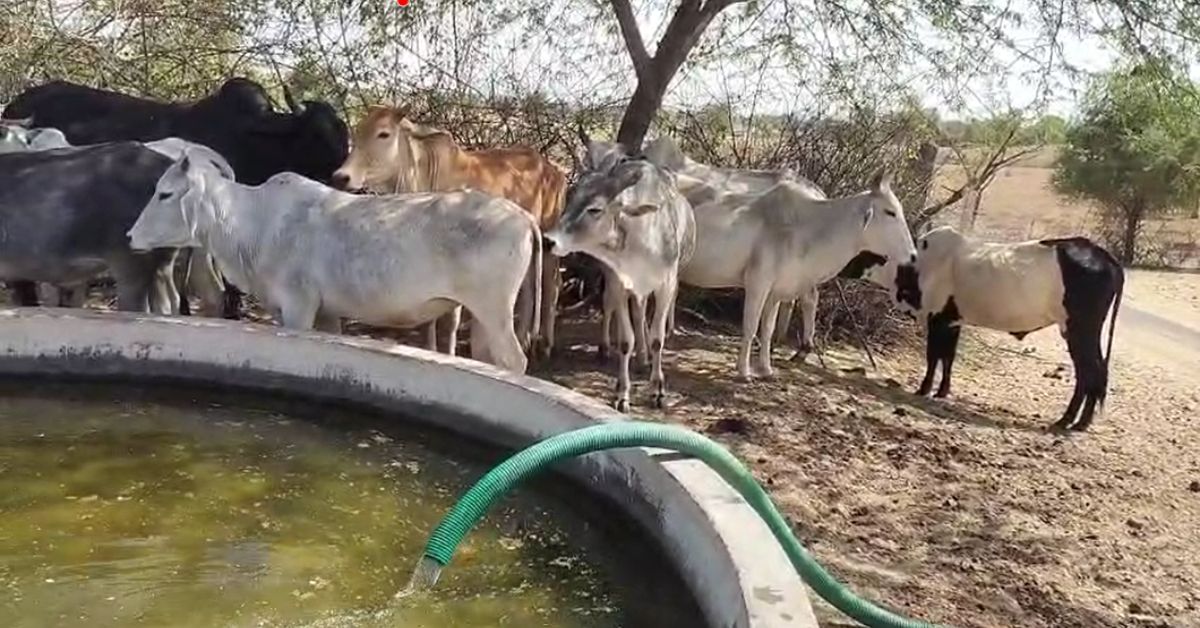
Moved by the plight of animals in the scorching Rajasthan heat, the seven friends — all government employees — took it upon themselves to act. They pooled in Rs 150 each, gathered Rs 1,000, and began placing food and water for birds and stray animals.
They called their group ‘Jeev Jantu Premee Bandhu Sanstha’, and began work on 7 March 2021. “When we started looking around the village, we realised that there wasn’t a single tank to hold water or food and water for these animals,” shares Dinesh.
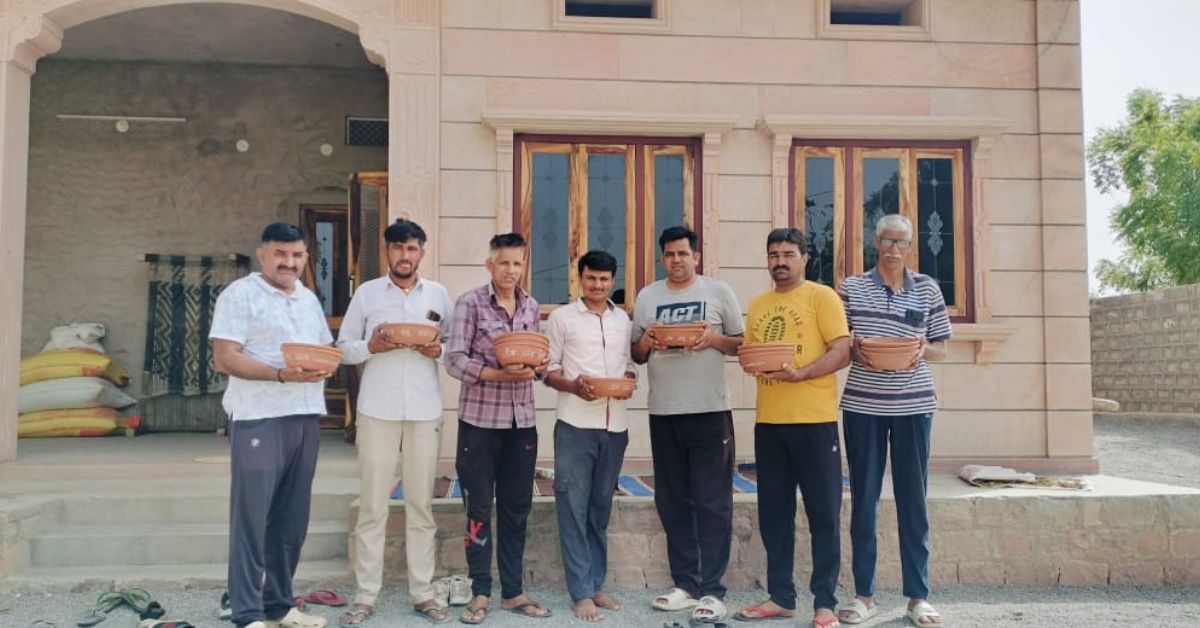
The group quickly sprang into action and constructed water tanks, both small and large, depending on the animals around. “We did this with our first funding of Rs 18,000, which we collected from members,” says Dinesh. “We also restored a few dried-up ponds and made use of them.”
“We started by placing 50 kg of grains and clean water daily using one tank. Slowly, others from the village noticed our efforts and joined us,” says Dinesh. What started as a seven-member team now has over 690 contributors, with 485 active payers.
Expanding to 35 villages
The organisation now works across 35 villages and supplies water to 21 large and 50 small reservoirs. In total, one village requires about 5,000 litres of water per day. Water alone has cost them Rs 24 lakh over four years.
“To ensure tanker operators stayed consistent, we started paying them regularly. We told them to keep the tankers clean and refill them daily,” says Dinesh.
This strategy worked. Over time, villagers began taking responsibility too. “Some were inspired by our work and started placing water and food themselves,” he adds. Their efforts also include building water storage structures and keeping regular checks through volunteers who update progress on WhatsApp.
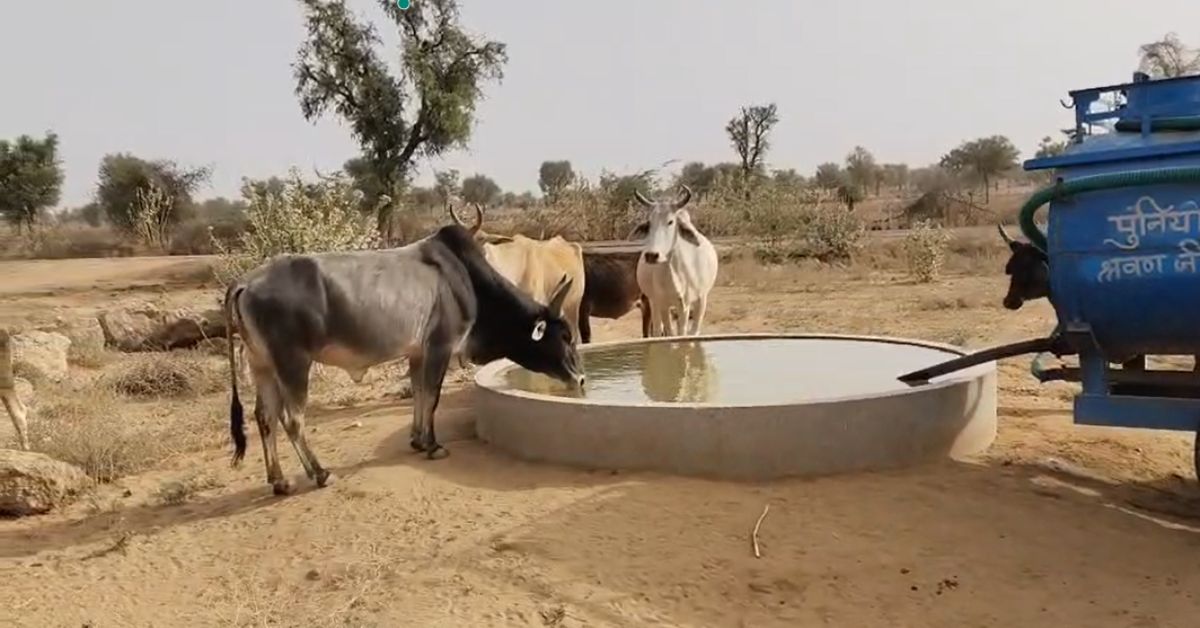
Their vision extends beyond hydration. When Lumpy Skin Disease swept through Rajasthan, they distributed medicines worth Rs 6 lakh. They’ve also planted over 8,500 saplings to combat desertification and distributed over 150 quintals of grain monthly for birds.
Their care extends to cows, dogs, deer, nilgai, and even migratory birds like the Siberian Kurja in Jodhpur’s Jajiwal Dhura region. “We don’t focus on domestic animals with owners. We help those who have no one else,” says Prakash.
How they fund it: a simple yet powerful system
Every member contributes a minimum of Rs 100 per month on the day of amavasya (new moon day) — a day fixed primarily for convenience — and many voluntarily offer more. “Today, we have over 690 active members — from police officers, nurses, teachers, army officials, to business owners, villagers, and farmers.
The monthly collection, which was Rs 1,000 in the beginning, reached Rs 1.48 lakh last month. As of March 2025, the group has collected a total of Rs 46.76 lakh and spent Rs 43.89 lakh on feeding and watering animals and birds.
“Our primary contributors are from Rajasthan, but people from other cities and states have also been generous and consistent with their contributions,” shares Dinesh.
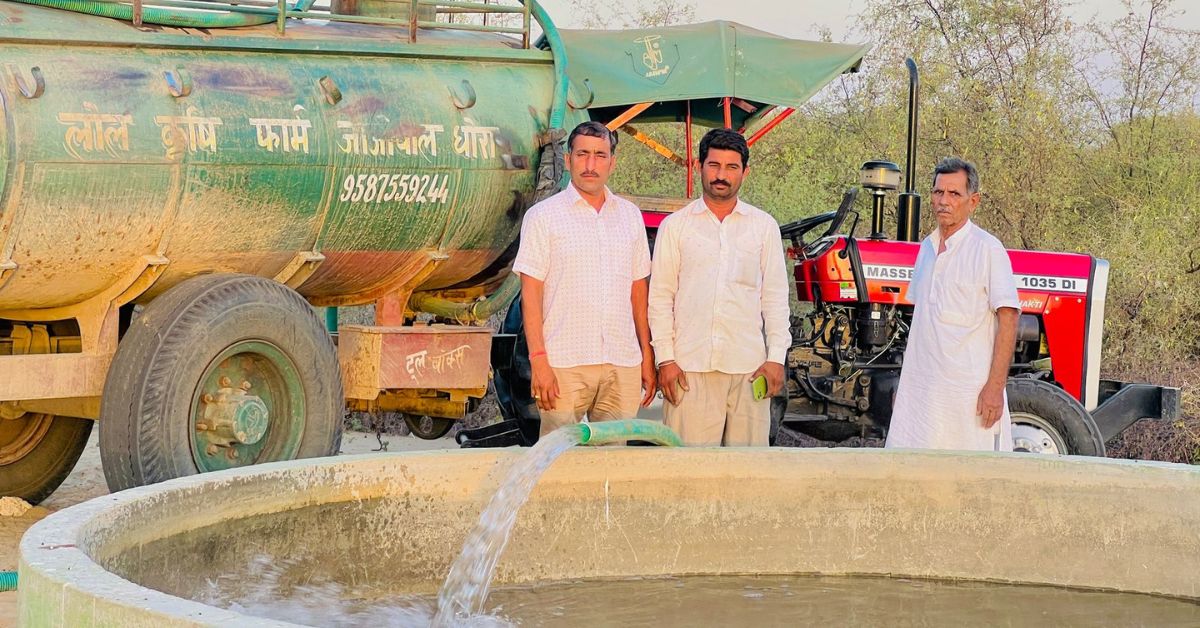
“This money was initially collected in our personal accounts, but for audit purposes and transparency, we created a separate account for the organisation,” adds Prakash.
Dinesh and the team utilise the ‘divide and conquer’ method strategically. “We save up the funds during the monsoon because we don’t have to spend much then. Later, we use the money saved during monsoon along with the monthly collections to carry out restoration work or cover other urgent expenses,” Dinesh adds.
Making the best use of WhatsApp
While the funding is consistent and sorted, Jeev Jantu requires people to manage the work on the ground. “Since we have our nine-to-five government jobs, we have found it difficult to manage everything ourselves,” shares Prakash. “That’s when we sought the help of the locals, who are also a part of the organisation.”
And the mode of communication? WhatsApp. “We have been managing everything via WhatsApp. We have a group where the designated individual informs us if any vessel runs out of water. Through video calls or the recorded video sent by the volunteer, we double-check and inform the water tankers to visit that particular location. Then they fill the tank, which is again documented and sent to us,” explains Dinesh.
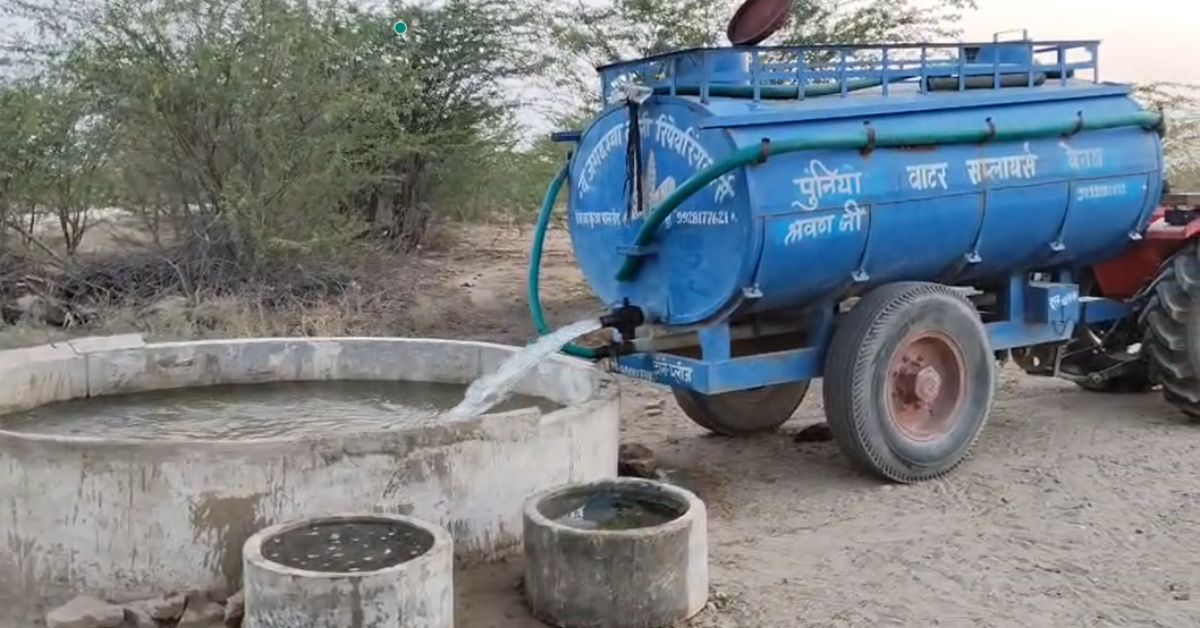
All fund collections, reminders, and updates on animal welfare activities are shared in these groups. “It also helps us to know our contributors and keep them informed about the animal welfare activities done in the villages,” adds Prakash.
“The Government officials from the locality have been supportive of the initiative,” says Dinesh.
Serving animals and birds consistently
Though the work is challenging, Dinesh, Prakash, and the other members remain deeply committed. “We may be from different professions, but we’re united by one purpose — compassion,” shares Dinesh.
“When you witness the sight of these poor animals running towards the water tanker from a distance, you will be motivated to do even more,” shares Prakash.
The group is currently working on expanding their work to more villages and possibly setting up a centralised water supply system to optimise tanker routes. They also hope to increase membership and raise more awareness about the importance of caring for animals in extreme weather.
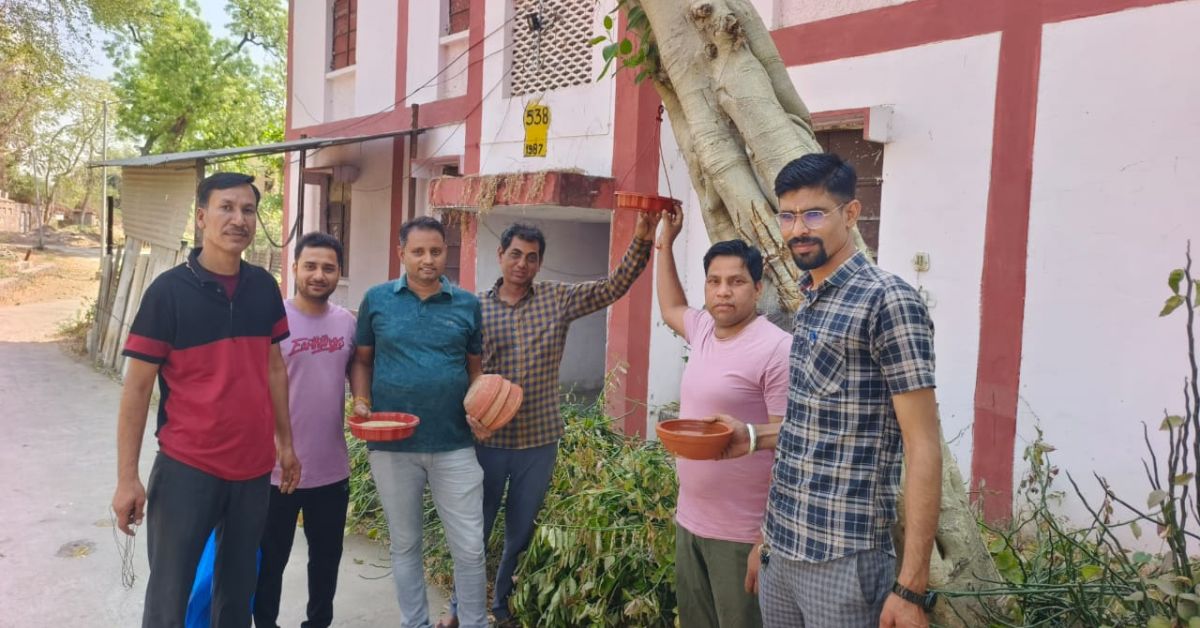
“Our aim is simple — no animal or bird should die of hunger or thirst, especially in Rajasthan’s unforgiving summers, and we will work till that goal is achieved,” Dinesh concludes.
Want to be part of this journey of compassion?
Support Jeev Jantu Premee Bandhu Sanstha in their mission to save thousands of animals and birds from hunger and thirst across Rajasthan.
Donate here:
A/c no: 40759264207
IFSC code: SBIN0032069
UPI ID: 9414119372@sbi
Contact no: 9414119372
Edited by Vidya Gowri Venkatesh; All images courtesy Jeev Jantu Premee Bandhu Sanstha




